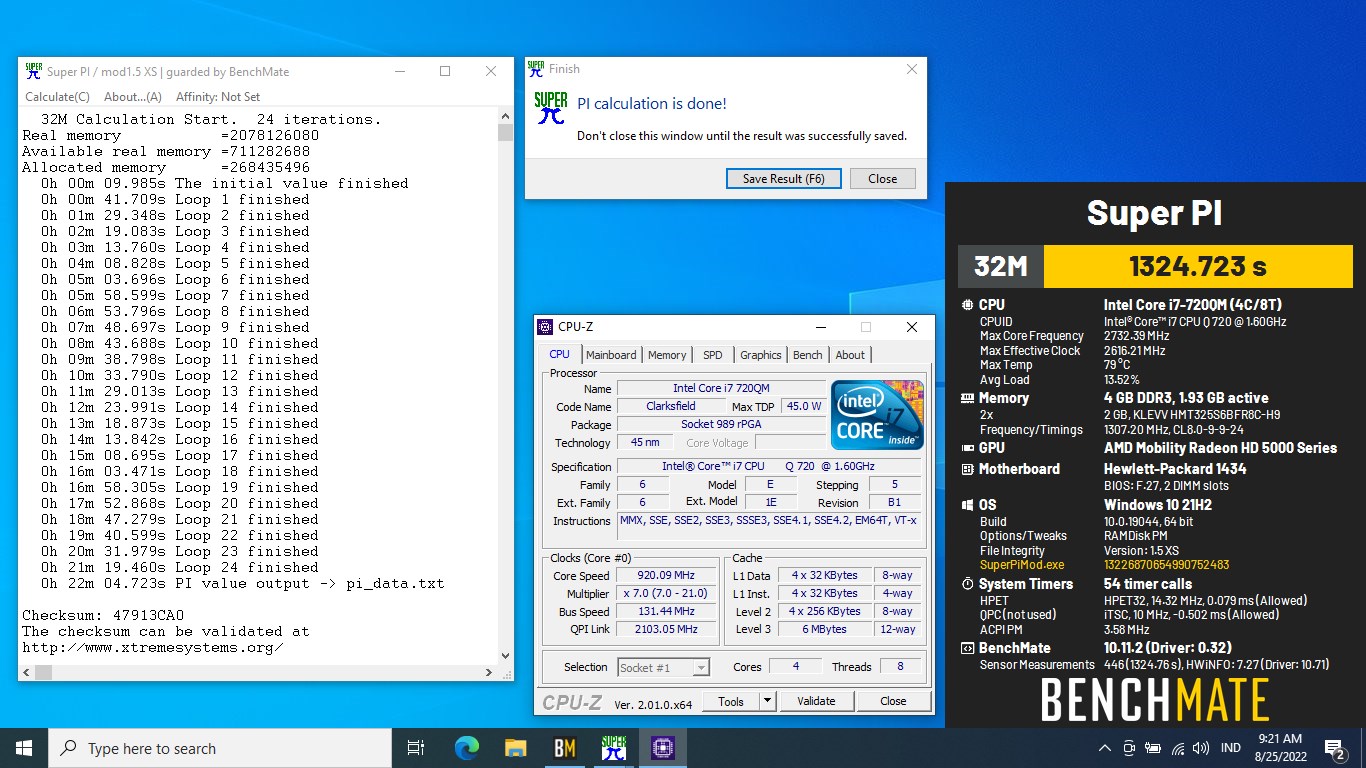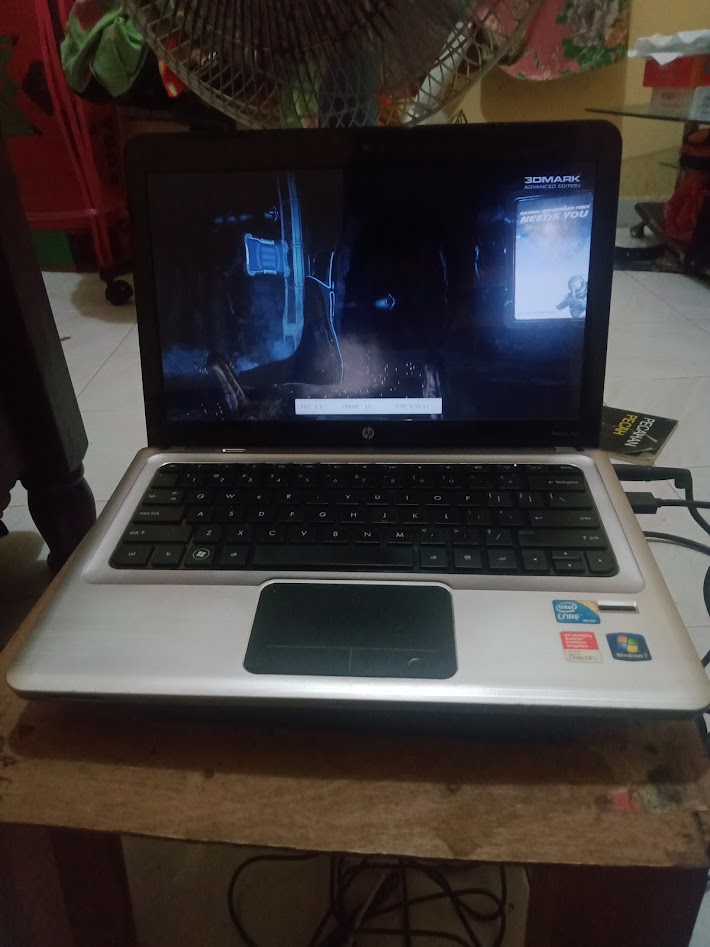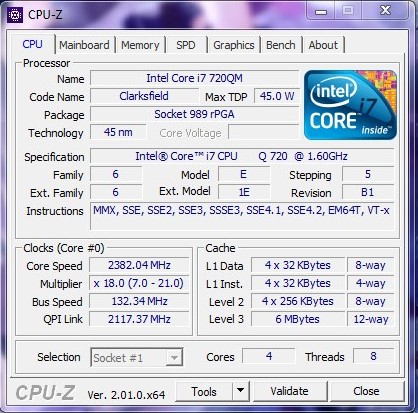SuperPi - 32M with BenchMate score 22min 4sec 723ms with a i7-720QM
Thursday, 01 January 1970 07:00 | Update at null
Media Gallery
Screenshot

Device, Setup, etc



URL
https://hwbot.org/submission/5067425https://bit.ly/3B5ZtUR
Information Detail
Hardware: Intel Core i7 720QM
Specs:CPUID : Intel(R) Core(TM) i7 CPU Q 720 @ 1.60GHz
Architecture : x86
Codename : Clarksfield
L3 Cache : 6MB
Clock : 1.60GHz - 2.80GHz
Core/Thread : 4/8
TDP : 45W
Technology : 45nm
Socket : PGA988
IGPU : -
See more specification...
Software: SuperPi - 32M with BenchMate
Score: 22min 4sec 723ms
About: SuperPi - 32M with BenchMateSuperPi - 32M with BenchMate is the modern version of the legendary SuperPi benchmark, renowned for its ability to measure single-threaded processor performance to the extreme. With the addition of BenchMate support, this benchmark delivers significantly higher result reliability, provides precise time validation, and safeguards system integrity against unauthorized benchmark result manipulation.
Essentially, SuperPi - 32M calculates the value of the constant π (pi) to 32 million decimal places. This process utilizes an intensive mathematical algorithm (Gauss-Legendre) that runs on a single processor core. This test serves as a real-world measure of how quickly and stably a single CPU core can handle pure computational workloads.
What is BenchMate and Why is it Important?
BenchMate is a benchmarking platform designed to:
- Eliminate system time manipulation (time cheating).
- Freeze the system clock, preventing Windows clock manipulation during benchmarking.
- Provide a complete validation log to ensure the validity of results.
- Protect system integrity with temperature, voltage, and background process controls.
With BenchMate integration, SuperPi - 32M results become significantly more reliable, making it ideal for:
- Professional overclocking competitions.
- Transparent validation of high-performance systems.
- Public benchmarking requiring high credibility.
Advantages of SuperPi - 32M with BenchMate
- Accurate and manipulation-free thanks to BenchMate's time-locking.
- Optimally measures single-core CPU efficiency.
- Detects system anomalies, such as throttling or interference from background processes.
- Very competitive execution time, suitable for fine-tuning RAM, latency, and CPU cache testing.
- Complete log output, ideal for documenting and publishing benchmark results.
Real-World Use Cases
- An overclocker wants to test the capabilities of their Ryzen 7000 Series CPU at a 6 GHz frequency. SuperPi - 32M with BenchMate provides valid results that cannot be manipulated by time-cheating software.
- Hardware development teams use this benchmark to compare IPC (Instructions Per Clock) across architectures, such as between Intel Raptor Lake and AMD Zen 4.
- Enthusiast users leverage these results as an indicator for memory tuning, as SuperPi is highly sensitive to RAM timing.
The Intel Core i7-720QM, launched in Q3 2009, was one of the first mobile quad-core processors to feature Intel's Nehalem microarchitecture, specifically the Clarksfield variant. Targeted at high-performance laptops, such as gaming machines and mobile workstations, the i7-720QM brought 4 physical cores and 8 threads to the mobile platform, thanks to Hyper-Threading Technology providing a significant boost in multi-threaded workloads like video editing, 3D rendering, and other professional-grade applications. The processor runs at a base clock speed of 1.6 GHz, but it can dynamically increase up to 2.8 GHz using Intel Turbo Boost, depending on thermal headroom and power availability.
Manufactured using a 45nm process, the i7-720QM has a TDP of 45W, which is quite high by today's mobile CPU standards. This thermal demand necessitated more robust cooling solutions in laptops that featured the chip. Unlike modern CPUs, the i7-720QM does not come with integrated graphics, which means systems based on this processor require a dedicated GPU often from AMD or NVIDIA for graphics processing and display output. As such, it was typically paired with mid-to-high-end discrete graphics cards in its time, making it a solid choice for gaming and multimedia laptops in the late 2000s and early 2010s.
While the Core i7-720QM was a powerhouse during its release, its performance and efficiency are significantly outpaced by modern CPUs built on smaller nodes and with higher IPC (Instructions Per Clock). Nevertheless, legacy laptops using the i7-720QM can still be viable for basic computing tasks like web browsing, document editing, or watching videos especially if paired with an SSD upgrade and increased RAM. Users running Windows 10 on such systems may experience some limitations, but with proper optimization and lightweight software, the CPU can still deliver a usable experience in non-demanding environments.
Hardware Detail:
Device: HP Pavilion dv3-4054TX
RAM: 4GB DDR3 Single Channel
OS: Windows 7, Windows 10
* Not Avaiable
